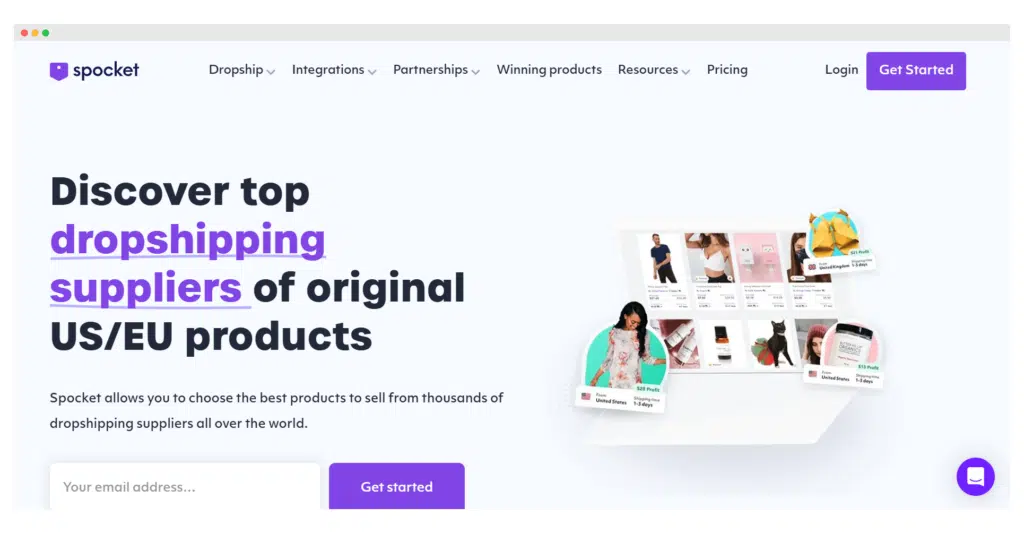Entering the business world requires crucial decision-making, one of the most significant being your production and fulfillment methods. Among various options, dropshipping and private label manufacturing stand out for their distinct advantages. Understanding these strategies can help you assess which is the most viable for your business.
What is Dropshipping?
Dropshipping is a popular order fulfillment strategy adopted by businesses worldwide. It serves as the vital framework ensuring consistent product availability for many companies. In order to understand how it works, it is essential to take a detailed look into the dropshipping model.
In dropshipping, the retailer doesn’t maintain physical inventory. Instead, the retailer acts as an intermediary between the manufacturer and the consumer, sourcing products directly from the manufacturer. This straight way of getting products ensures they’re always available when needed, without using extra middlemen.
Automation plays a pivotal role in dropshipping. Renowned companies like Niche Dropshipping have integrated automation into their process, streamlining order fulfillment and shipping. Here, the customer places an order at the retail price, and the retailer retains the profit margin over the wholesale price paid to the supplier. In other words, the retailer benefits from the price difference without the need for physical inventory management.
When you start exploring dropshipping services, consider visiting our friends’ website 👉 Spocket.
It’s crucial to enter the dropshipping market with a keen eye on supplier quality. Spocket is known for its strict screening process, ensuring that only suppliers who meet their high criteria are chosen as partners. They will make your dropshipping journey easier and more enjoyable.

What is Private Label Manufacturing?
Compared to dropshipping, there’s private label manufacturing. This method creates custom products specially for stores to sell under their own brand name. Private label manufacturing gifts retailers the freedom to select product formulas, tailor designs, and implement customizations that align with their brand’s vision and ethos. This customization level results in a uniquely branded product that can only be sold by the retailer who ordered it, offering an unparalleled branding opportunity.
Private label manufacturing is like getting the best of both worlds. It lets you make a basic product but also allows you to add special touches that make your brand stand out. The machines used for production are already set up, which means faster production and smaller order amounts are possible.
This is where Wonnda comes into play. Wonnda is a platform that expertly matches businesses with the right private label manufacturers. Our main aim is to help your customers get top-quality products that carry the distinct touch of your brand.
What is Private Label Dropshipping?
Private label dropshipping is a mix between dropshipping and private label which gives sellers some good benefits. After selecting a product, you can work closely with the manufacturer to finalize the product, packaging and branding. Since it incorporates the essence of private labeling, you have the freedom to determine the final appearance of the product. Additionally, much like traditional dropshipping, there’s no need for you to deal with inventory hassles.


Furthermore, having an online store allows for direct sales to your customers, avoiding any referral fees. Operating under a unique brand name also means that you can list products at a premium, often leading to larger profit margins than standard dropshipping. However, as you embark on the journey of private label dropshipping, it’s vital to choose products in high demand. After determining the product, you’d need to engage with third-party manufacturers who can offer it at the right price. Then, with your brand and labels ready, you can showcase the products on your online platform and kickstart promotions.
Exploring the Pros and Cons: Dropshipping, Private Label Manufacturing and Private Label Dropshipping
When launching a business, it’s crucial to understand the potential rewards and challenges associated with different strategies. Below, we delve into the pros and cons of dropshipping, private label manufacturing and private label dropshipping.
Advantages of Dropshipping
Low Initial Investment
Dropshipping is a popular choice for startups and smaller businesses due to its low entry costs. It allows entrepreneurs to launch a brand without the need for significant upfront investment.
Product Diversity
Dropshipping enables you to offer a wide variety of products without worrying about stock management or storage space. You simply list the products on your platform, and the supplier fulfills the orders.
Minimal Risks
As a dropshipper, there’s no need to maintain a massive inventory upfront. If certain products aren’t moving, you can easily discontinue them without stress over unsold stock. Simultaneously, you have the flexibility to introduce and list fresh products in your store.
You Need Limited Expertise
You don’t need to know a lot about logistics and product research to dropship products online. This is why many people end up selling a variety of products at the same time.
Challenges of Dropshipping
Lack of Branding Opportunities
With dropshipping, products typically go straight from the manufacturer to the customer, limiting your opportunities for branding and customization.
High Competition
Given its low entry barriers, dropshipping is a highly competitive market. Standing out requires strategic marketing, unique product offerings, or outstanding customer service.
Using Outside Shipping Can Cause Problems
Shipping management is an aspect outside of your control. Whether it’s the manufacturer or a third-party service fulfilling the orders, any mistakes made can negatively affect your reputation.


Advantages of Private Label Manufacturing
Enhanced Branding and Customization
Private label manufacturing allows for product customization and branding, providing an opportunity to differentiate from the competition. You can control the look, feel, and quality of your products, creating a unique customer experience.
Opportunity to Create a Recognizable Brand
When you invest time, effort, and resources in creating positive customer experiences, it leads to greater brand loyalty. Also, private labeling lets you grow your business. After launching one or two good products, smart sellers work on opening their own shops. They start selling related products, using what worked well before to help them do well again.
Price Control
With private label, you have more control over the product’s pricing. Unlike dropshipping, where pricing tends to be influenced by market rates, private label allows you to set prices based on your costs, desired profit margins, and perceived product value.
Challenges of Private Label Manufacturing
Higher Initial Investment
Private label manufacturing typically requires a larger initial investment than dropshipping. You’ll need to account for product development, branding, and minimum order quantities.
Greater Risks
With private label, you face extra risks like having to buy at least the manufacturer’s minimum number of products. You’re also mainly in charge of making sure the products are good and the customers are happy. However, you can order samples first to check the quality before making a large purchase.
Advantages of Privat Label Dropshipping
Control Over the Product’s Design
Once you’ve chosen a product, you can discuss with your manufacturer the specifics of the product and packaging design. Since this falls under private labeling, you have the final word in the product’s appearance.
No Inventory Issues
Similar to standard dropshipping, there’s no inventory for you to keep or manage.


Higher Profit Margins Than Traditional Dropshipping
Owning an online store allows you to sell straight to your customers, avoiding any referral fees. And because you’re selling products under your own brand name, you can set higher prices.
Challenges of Private Label Dropshipping
Dependence on Vendors
Your business success depends on your supplier or manufacturer to ship on time, even if you’re doing everything right. If they fall short, it can harm your business.
Taking On More Than You Can Handle
Sellers might opt for private label dropshipping, believing it’s as easy to start as regular dropshipping, but that’s not the case. Private labeling still requires thorough product research and finding reliable suppliers. Additionally, the complexity of logistics often means you’ll need to partner with a sourcing agent or use a private label dropshipping service, increasing your costs even more.
In Conclusion: Why Private Label Wins
While dropshipping might seem an attractive option due to its ease of setup and lower initial costs, the long-term benefits of private label manufacturing make it a powerful investment for businesses seeking sustainable growth and strong brand identity. Let Wonnda guide you on this journey to create a distinct and successful brand in the consumer goods industry.